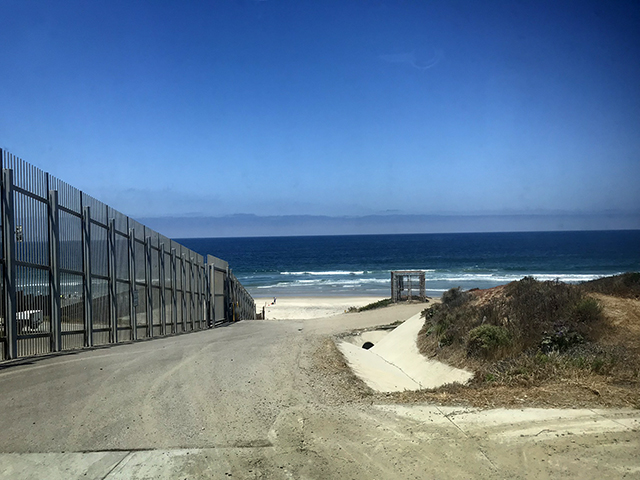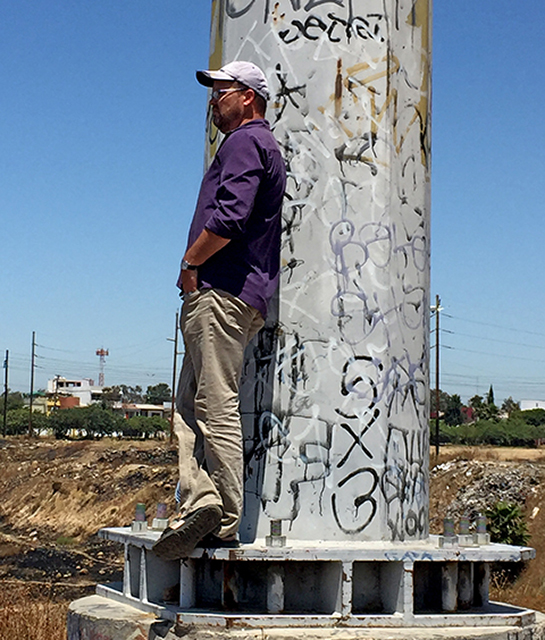What Does It Look Like To …
By Alicia Rusoja

This is the second in the current series of four reports from the US-Mexico border.
What I witnessed with my colleagues on our visits to shelters and community organizations during our week-long border immersion trip in Tijuana, Mexico, answered the following questions:
What does it look like to regard the life of another human being as you would regard your own life, your loved one’s own life, your child’s, your mother’s, your brother’s?
What does it look like to view your life as dependent on, and interdependent with the life of a stranger, on the life of a child or parent or sibling of another human being?
What does it look like to have respect and admiration for the life and the strength of someone else, a migrant who is willing to put their life on the line in every conceivable way for the sake of their dignity, survival and their family’s ability to be well?
What does it look like to say: “you have the same rights I have, and whatever resources this earth gifts aren’t my own but instead are equally yours and mine”? What does it look like to view earth’s resources, such as land, water, food and shelter, as communal and not as finite things to be owned and used as commodities, controlled only by a few for a few?
Wherever I sleep, you may sleep, whatever I eat you may eat, whatever I have is ours to have. I do not ignore your death, your struggle, your strength. I do not pity you. I put my life on the line as you put yours.
What does it looks like to say and act upon this statement: Your struggle is my struggle: Tu lucha es mi lucha, as my undocumented friend Olivia says.

What I witnessed in the Instituto Madre Asunta shelter, at the Centro del Migrante shelter, at Border Angels shelter, at Dreamers Moms and Deported Veterans bunker, at Ollin Cali’s tour of the housing, labor and environmental violations experienced everyday by migrants working at maquiladoras (transnational corporations’ factories) in Tijuana, answered all the questions I note above. The immersion nourished in me deep heartbreak and awe for all the ways in which people in Tijuana everyday defy the hegemonic imperialistic capitalist discourse of scarcity and individualism.
Trump has forced migrants aiming to make a life in the U.S. to remain in Mexico and from there follow an unofficial, unregulated, metering system where migrants are assigned numbers that correspond with their place in a months-long waiting line to obtain a U.S. immigration court date. Trump also threatened Mexico with tariffs if it does not ensure a reduction in the number of migrants crossing into the U.S. Forcing migrants to remain in Mexico and follow this unregulated and unofficial metering system known for its corrupt practices (where migrants pay Mexican officials between $700-1000 USD per person to be moved up the list) has directly led to shelters reconfiguring their practices and capacities. Places, like Casa del Migrante, which traditionally have only sheltered single men now accept fathers and even mothers with their young children. They also now offer support to migrants for finding work and rented housing in Tijuana, as well as for applying for permanent residency in Mexico, understanding that most migrants will have to overstay the very short-term humanitarian/migrant visas Mexico now gives out to migrants since waiting for their turn to speak to a U.S. immigration judge through the metering system always takes more than the 40-90 days these humanitarian visas are valid for. We met migrants in early July 2019 whose numbers in the metering system were not expected to come up until October 2019 or even until March 2020. Trump’s pressure on Mexico to completely stop migration into the U.S. has led the Mexican government to choose to completely cut funding for migrant shelters. Lack of funding has caused the closing of many shelters we were told. Against all odds, and defying Trump’s and the Mexican government’s goals, many shelters remain open, with migrants, volunteers, and community members ensuring they work.
Border Angels, a volunteer-run organization supporting the functioning of many smaller unfunded shelters (in churches and other non-registered places), including one of their own, told us of dozens of shelters functioning informally with volunteers (including migrants themselves) doing everything they can do provide migrants with shelter, food, and clothing, without a formal infrastructure.
At Border Angels, we learned of an ongoing practice by the Mexican military: walking around Tijuana asking anyone close to the border wall, including Border Angels staff, for identification papers (which would show whether or not they are migrants and whether they have overstayed Mexican humanitarian visas and are due for deportation), targeting pro-migrant Mexican activists, threatening to take them away for their activism. The Mexican military multiple times has come knocking on the door of the Border Angels shelter to check the papers of those inside, essentially aiming to conduct raids (completely over stepping their role) to decrease the number of migrants waiting to immigrate to the U.S. We learned of Mexican and U.S. citizen volunteers refusing to show their papers to military, refusing to let the military enter the shelters to criminalize migrants.
“Their t-shirts said: “have you seen my child?” or “have you seen my mother?”.
Dreamers Mothers, a group that partners closely with Deported Veterans, has successfully supported deported mothers living in Tijuana, through grassroots fundraising to hire lawyers to fight custody cases in the U.S. With immense support, some of the mothers have been able to appear in their custody cases by video using Skype (though this isn’t being allowed anymore by courts in the U.S.) and win their ability to remain in contact with their children (having “visitation rights” by phone, for example) even while remaining deported. We heard of cases of deported mothers who do not know where their children are now in the U.S. because the government put their children in foster care and never respected their legal right as the children’s parents, of deported mothers whose partners denied them the right to speak to their children for years (one for over 15 years!), of deported mothers who are now processing U-Visa cases because they were victims of a crime (including kidnaping and rape) in the U.S. and aided authorities in solving such crime yet purposefully were not told they qualified for U-Visas. We were told by the founder of Dreamers Mothers that when we meet children in the U.S. whose mothers have been deported to please given them a big hug and tell them their mothers love them and are fighting to be able to see them again. This was really heart breaking. Their t-shirts said: “have you seen my child?” or “have you seen my mother?”.
Yolanda, the founder of Dreamers Mothers talked to us about art-based healing workshops she and others are co-facilitating to help the migrant children process the trauma they are experiencing, including separation or imminent separation from their mothers and/or fathers. She told us in great detail about puppetry workshop she had just come back from and how very hard it had been for the adult facilitators to prepare migrant children to be separated (in past, now, and most likely in the future if allowed to cross into the U.S.) from their parents.
Through these stories and our witnessing, we saw how the city of Tijuana and its inhabitants (migrants and Mexicans alike) have maintained a pro-immigrant & welcoming stance, continuing to shelter and care for migrants even when the Mexican government has taken away funds to run shelters, when prevalent stigma portrays migrants and deportees as “criminals” who deserve violence, when here and across the world politicians argue that “receiving” cities are full, that there aren’t “enough” resources for everyone.
Tijuana’s inhabitants’ approach to sheltering and caring for immigrants made me consider what it would really mean for all cities to offer sanctuary to migrants, to challenge the capitalist, imperialist and oppressive idea that one’s worth only comes from one’s ability to produce capital. We saw people stretching and sharing all resources; demonstrating humanity and hope are fiercer than the hegemonic discourse and practice of imperialism, xenophobia and the criminalization of life.
.